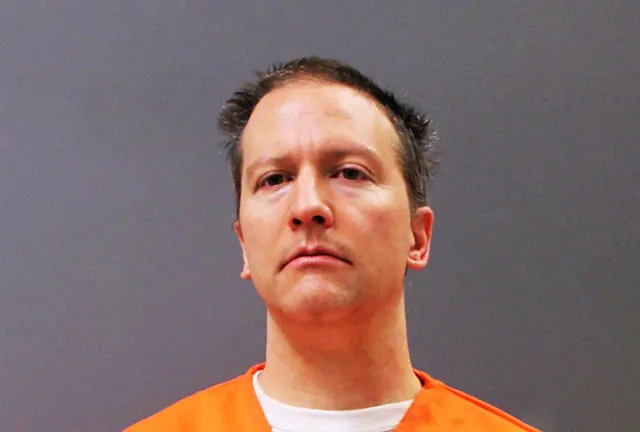mocobizscene – According to a reliable source, Derek Chauvin, the ex-Minneapolis police officer who was found guilty of the murder of George Floyd, was stabbed by a fellow inmate and sustained serious injuries on Friday at a federal prison in Arizona.
According to an anonymous source who spoke to the AP on the condition of anonymity, the Federal Correctional Institution in Tucson, a medium-security prison, was the site of an attack. This particular facility has had issues with security lapses and staffing shortages.

According to a statement by the Bureau of Prisons, an inmate at FCI Tucson was subjected to an assault that took place at approximately 12:30 p.m. local time on Friday. The agency confirmed that their staff members intervened promptly, containing the incident and administering life-saving measures to the victim before transferring them to a hospital for further treatment and evaluation. The inmate’s identity was not disclosed by the Bureau of Prisons.
The Bureau of Prisons has confirmed that no employees were harmed in the incident. The FBI has been informed about the situation. As a precautionary measure, visitation to the facility, which currently houses approximately 380 inmates, has been temporarily suspended.
Chauvin’s lawyers and the FBI were both contacted for comment but did not immediately respond.
Another federal prisoner has been attacked in a high-profile incident. Just five months after disgraced sports doctor Larry Nassar was stabbed by a fellow inmate at a federal penitentiary in Florida, Derek Chauvin, the ex-police officer convicted of George Floyd’s murder, was also stabbed.
In just over a year, the Tucson federal prison has experienced another significant incident. Back in November of 2022, an inmate at the low-security prison camp attempted to shoot a visitor in the head with a gun. Despite the fact that the inmate was not supposed to have the weapon, it malfunctioned, and thankfully, no one was injured.
In August 2022, Derek Chauvin, aged 47, was transferred from a maximum-security prison in Minnesota to FCI Tucson. He is serving a 21-year federal sentence for violating George Floyd’s civil rights and a 22 ½-year state sentence for second-degree murder.
According to court papers filed last year by Eric Nelson, Chauvin’s lawyer, he had requested that his client be kept away from other inmates and out of general population due to the likelihood of him being targeted. As a result, Chauvin was primarily placed in solitary confinement in Minnesota for his own protection.
The murder conviction appeal made by Chauvin was rejected by the U.S. Supreme Court last week. Additionally, he is attempting a highly unlikely effort to overturn his federal guilty plea by citing new evidence that suggests he did not cause Floyd’s death.
On May 25, 2020, George Floyd, who happened to be Black, was subjected to an excruciating experience that ultimately led to his death. Derek Chauvin, a white police officer, pinned Floyd down by pressing his knee on his neck for 9 and a half minutes. This incident took place on the street outside a convenience store where Floyd was suspected of trying to pass a counterfeit $20 bill.
Video footage captured bystanders hearing George Floyd’s fading cries of “I can’t breathe.” His tragic death sparked global protests, with some turning violent, and spurred a widespread reflection on issues of police brutality and racial discrimination.
Floyd’s death had resulted in the sentencing of three other ex-officers who were present at the scene. They were given reduced sentences by both the state and federal courts.
The federal Bureau of Prisons has been under the microscope in recent years due to high-profile incidents such as Jeffrey Epstein’s jail suicide in 2019. Unfortunately, even the most high-profile prisoners are not safe in their custody, as evidenced by the stabbing of Nassar and the suicide of “Unabomber” Ted Kaczynski at a federal medical center in June. Chauvin’s recent stabbing is yet another example of the agency’s inability to provide proper security measures for their inmates.
According to a recent investigation by the AP, the Bureau of Prisons – the largest law enforcement agency of the Justice Department with a mammoth budget of around $8 billion, over 30,000 employees, and 158,000 inmates – has some serious, previously unreported flaws.
Read More: One Person Was Shot And Killed In Shooting Incident In The Southwest Las Vegas Valley
According to recent reports by the AP, staff members have been engaging in widespread sexual abuse and other criminal activities. Additionally, there have been numerous instances of inmates escaping, chronic violence, deaths, and severe staffing shortages. These issues have greatly hindered the ability to respond to emergencies, including inmate assaults and suicides.
Last year, Colette Peters was appointed as the Director of the Bureau of Prisons to address the ongoing crises within the agency. Peters pledged to overhaul outdated hiring procedures and promote greater transparency. She also highlighted the agency’s primary objective of fostering good relationships with the community, rather than solely focusing on managing inmates.
In September, Peters appeared before the Senate Judiciary Committee and highlighted the measures she had implemented to revamp correctional facilities and strengthen internal affairs investigations. Recently, during a hearing with a House Judiciary subcommittee, she reported that the hiring situation had improved and that the number of new hires exceeded the number of retirements and other departures.
Lawmakers have been displeased with Peters, accusing her of breaking her promise to be transparent with them. Back in September, senators expressed their disappointment with her for delaying responses to written inquiries for over a year and for stating that she was unable to provide basic information regarding the agency’s procedures, such as the number of correctional officers employed.
Read More: Police Searching For Suspect In The Murder Of A Dothan Teenager On Thanksgiving Eve



